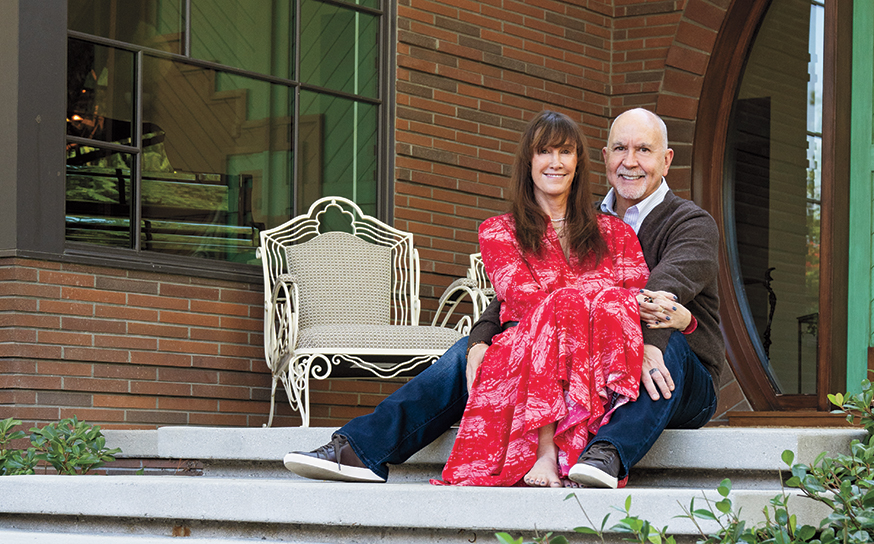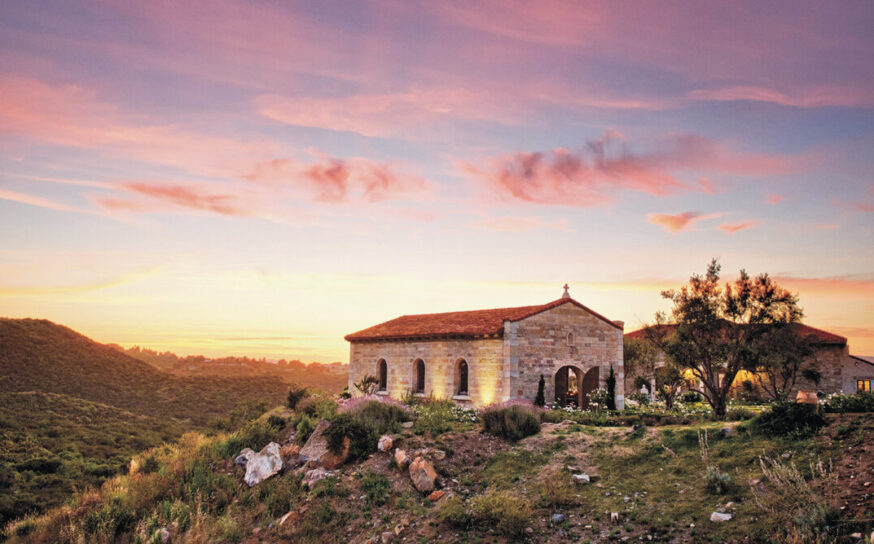
Frank Leon clearly revels in fatherhood the second time around. Take this story that he shares about his sons, 9-year-old Issa and 6-year-old Abu, hanging out at La Loggia, one of his three Studio City restaurants.
“They were walking around filling water glasses when a woman asked Issa who they are. Issa gave this big, confident grin, pointed to Abu, and said, ‘We are the owners.’”
Just a few years ago, Issa and Abu were living in dilapidated concrete homes with dirt floors, in two separate towns in Sierra Leone. Located on the western coast of Africa, it is among the world’s poorest nations and has an average life expectancy of 50. About half of the deaths are due to poor sanitation and hygiene, food insecurity and lack of safe drinking water. Both boys’ fathers are deceased.
After a series of serendipitous events that led them to West Africa, Frank and his wife, Margarita Manduley-Leon, adopted the boys and brought them to Los Angeles in 2017. Immigrants themselves, they raised two daughters in Los Angeles—Erika, 28, who lives in Barcelona; and Camila, 20, a junior at George Washington University.
Sitting in the living room of their Spanish-style home in Toluca Lake, where Margarita’s 90-year-old mother also resides, the couple reflects on where their lives began—recalling the unexpected journey that fills them with gratitude and wonder.

NEW BEGINNINGS
After a two-year adoption process, Frank and Margarita returned to the boys’ villages in summer of 2017 to fly them to LA.
HUMBLE BEGINNINGS
The two met nearly 40 years ago at a party in what is now known as Koreatown, when Frank overheard Margarita speaking Spanish. “These days you’ll hear many people speaking Spanish, but back then it wasn’t the case,” states Frank.
A native of Costa Rica, Frank immigrated to the U.S. at 17 with only a sixth-grade education (although he eventually earned a GED), and was not fluent in English when they met. At the time he was working in the kitchen of the long-gone Rex il Ristorante. Margarita was a journalism student at USC. She had immigrated to the U.S. at age 12 from Cuba with her parents, settling in Echo Park among a small Cuban community. Speaking only Spanish, she was placed in ESL classes.
Both had experienced tragic loss.
Frank’s parents both passed away before he reached adolescence—he lived with his uncle until making a solo move to the United States. Margarita was separated from older siblings during the 1960s covert operations in Cuba. She lost her father at 14, leaving her mother to work an 11 p.m. to 7 a.m. factory shift to support them.
Frank and Margarita solidified a friendship, but it wasn’t until almost a decade later that they would forge a life together. Frank started working at La Loggia in Studio City nearly 35 years ago, eventually buying the restaurant and the building, which also houses his bar/eatery, Ceremony. He also owns The Village, a mile west on Ventura Boulevard.
In their early years together, Margarita worked as a court interpreter, but during her second pregnancy decided to study law, ultimately graduating from Loyola Law School. She went on to partner in Manduley & Camisassa, specializing in immigration law.

LIFE INTERRUPTED
Their lives pivoted when daughter Camila was diagnosed with scoliosis in elementary school. By age 14 the disease had rapidly progressed, and they were told she needed to undergo spinal surgery. The family flew to New York to consult with orthopedic surgeon Dr. Oheneba Boachie-Adjei, who they heard was among the best in the country. He confirmed that surgery was the only option. Ultimately, Camila underwent a successful operation at Children’s Hospital Los Angeles.
While meeting with the physician, they also learned about his groundbreaking work at FOCOS Orthopedic Hospital in his native country, Ghana, which specializes in complex spine and joint-replacement surgeries on patients in developing countries.
“We were so excited to hear about FOCOS’ efforts that we humbly told him we wanted to hold a fundraiser,” shares Frank. “To our surprise, he showed up unannounced at the event.” That was 2014, and to date, the Leons have raised nearly $150,000 for FOCOS. An Evening of Hope, which the surgeon also plans on attending, will be held on October 27 at The Village in Studio City.
FOCOS is among the Leons’ many philanthropic efforts—they’ve donated and hosted fundraisers for local schools, the Los Angeles Fire Department as well as Friends of Caritas Cubanas for hurricane assistance. The couple also helps with expenses for several children in Sierra Leone.
Wanting to learn more about FOCOS, Margarita and Camila flew to Ghana to volunteer—“playing games, reading, and doing arts and crafts.”
Among the first children they met was Issa, who was 5 at the time, and the trio bonded immediately. He had been found in a remote village in Sierra Leone by the nonprofit African Surgery and flown to FOCOS, where he was being treated for kyphosis (a malformation of the spine). “If it hadn’t been for the treatment by Dr. Boachie and FOCOS, he would be dead or in a wheelchair,” states Margarita.
They texted Frank a photo of the three of them: “We’re in love.”
Issa had lived at FOCOS for two years due to the Ebola epidemic, as travel to and from Sierra Leone was forbidden. Once back in the States, the family couldn’t get the little boy off their minds. They helped with Issa’s living costs, and kept in touch via phone calls.
The following year, Margarita and Camila returned to volunteer at FOCOS. By that time, Ebola restrictions had been lifted, flights to Sierra Leone had resumed, and Issa was back in his village. Mother and daughter set off to visit him—a trip that would include taking two planes, a speedboat journey in the middle of the night, and being tested for Ebola.
Margarita recounts their trek: “As the only two people who exited the plane, we walked toward this building where we were the only foreigners. Everyone had to wash hands and have temperatures taken. And at the time, I just thought ‘What kind of mother am I putting my daughter in this situation?’”
Camila, who would soon start college, was the first to float the idea of adopting Issa, who at the time was in temporary foster care with a peace worker. She also suggested he should have a sibling from Sierra Leone.
Margarita laughs when she remembers her youngest daughter’s words: “Mom, I don’t think it’s a good idea for you two old Latino parents to adopt an African boy to grow up alone in Toluca Lake.”

Abu and Issa in their backyard
FAMILY MATTERS
Undaunted, Margarita took Frank back to Sierra Leone to meet Issa. Meanwhile, they heard about Abu, who was 3 at the time and lived in a nearby town. The couple discovered the town did not have a working well, so they raised money to build a new one—“because women and girls had to walk 30 minutes in dangerous conditions to bring back fresh water,” explains Margarita.
After spending time with Issa and Abu and their families, the mothers each told the Leons that they wanted better lives for their sons. The mothers wanted the Leons to adopt them.
While Margarita and Frank don’t consider themselves to be particularly religious, they do believe that the children came into their lives for a purpose. As Margarita puts it, “It was like the universe was telling us something.”
Frank explains that throughout the nearly two-year adoption process, he and Margarita kept asking the mothers if they were certain that they wanted to give up their parental rights. “It’s so complicated … we wanted to make sure we were doing the right thing.”
Margarita reminisces about the farewell celebration in Issa’s town, which she describes as “joyous singing,” upon their departure.
“Our adoption is very different because we didn’t go through the orphanage system,” explains Margarita. “Issa and Abu’s families are our family—we promised to always keep the boys in their lives … and bring them back to see their culture.”
Photos of their families hang above the boys’ beds, and they speak to their mothers a few times a month.

IT TAKES A VILLAGE
Bringing two boys from Africa to Los Angeles is not without significant challenges, and for the Leons’ community, it was give-back time.
“Neighbors and friends have been amazing—supplying clothes, toys, books, bikes, sports equipment … strangers donated beds,” shares Margarita, still overwhelmed by the generosity. “I went to get the boys myself and had been gone two weeks. We returned to find that my best friends got the key from Frank, painted and completely furnished the room.”
Issa and Abu attend Rio Vista Elementary in North Hollywood. Having been raised speaking Krio (English mixed with French-Creole), both are now fluent in English. They are friendly and polite, clever and curious, and fiercely protective of each other—“even if they fight and bicker,” as siblings do, notes Margarita.
Both are naturally athletic. They learned to swim after a couple of lessons and rode bikes without training wheels. Issa loves to dance, plays basketball, and just joined Toluca Baseball. Abu is partial to gymnastics. They name Steph Curry and LeBron James as their favorite basketball players, and are Dodgers fans. Both are fascinated by electronics, especially the Kindle Fire, but can also be found playing an old-school game of Connect Four.
The Leons say they are indebted to the parents they’ve met at school, and coaches at Beeman and North Weddington parks. “Rio Vista is about 20% black. Many of these dads have embraced our boys as role models because they know they need them,” explains Margarita. “As immigrants ourselves, we can relate somewhat to what they are experiencing, but we’ll never be able to teach them what it is like to be a black person in America, and the fact that they are from Africa adds more layers of complexity.”
For the past two summers, Margarita has taken the boys to PACT, a family camp in Atlanta, Georgia, where they are surrounded by children being raised by nonbiological parents and who are also different races. “It helps to reinforce their identity and combat racism,” through discussions with adults and children.
Together, Frank and Margarita coordinate morning duties, school pickup times, and manage play dates and extracurricular activities—and are vigilant about making sure the boys’ psychological and educational needs are met. And of course, Issa and Abu have become regular fixtures at Frank’s restaurants.
Margarita shares that their daughters, who are very close to Issa and Abu, have discussed a plan to take care of the boys should anything happen to Frank and Margarita.
“When we think about whether we did the right thing at our age, we know in our hearts we have,” says Frank. “We both came into this country with nothing. Margarita has something to offer with a career where she assists and helps immigrants, and having a bit of success in business myself, we said to ourselves—somebody gave us a hand at one time, and now it’s our turn. We always encourage them that one day it is going to be their turn.”
Join the Valley Community









